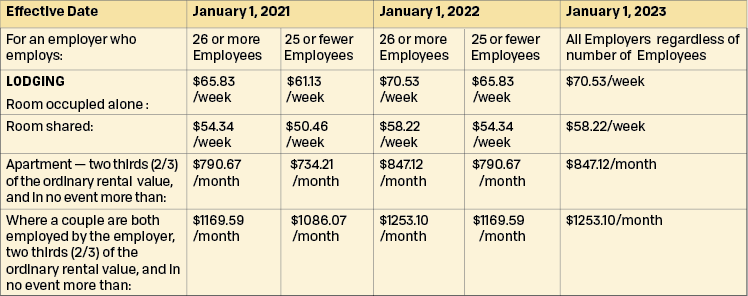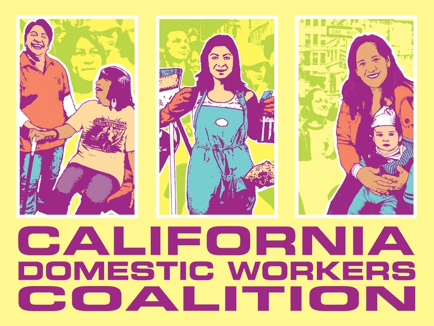WORKERS AT BOARD AND CARE HOMES AND RESIDENTIAL CARE FACILITIES FOR THE ELDERLY HAVE RIGHTS ON THE JOB!
Residential Care Facilities for the Elderly are sometimes called Care Homes or Board and Care. They are facilities that provide meals, housekeeping, supervision, distribution of medication, and personal care assistance with basic activities like hygiene, dressing, eating, bathing and transferring.
Below are some of the most important rights you have as a worker at a Residential Care Facility for the Elderly. No matter what your immigration status is, all immigrants have rights as workers. Whether or not you have papers to work or are paid in cash, you have the right to claim the wages you are owed and to speak up about your rights.
You have the right to be paid at least the minimum hourly wage for all hours worked:

You have the right to overtime and doubletime pay*:
- 1.5 X your hourly rate for work after 8 hours in a day, after 40 hours in a week, and for the first 8 hours on the 7th consecutive day of work.
- 2 X your hourly rate after working 12 hours in a day and after working 8 hours on the 7th consecutive day of work.
- For example, if you are regularly paid $16 an hour:
- Overtime pay would be 1.5 X $16= $24 per hour
- Doubletime pay would be 2 X $16= $32 per hour
*There are special overtime rules for personal attendants employed by non-profit institutions and caregivers who supervise children in a residential facility.
If you work 24-hour shifts or are a Live-In Worker:
- Employers can deduct up to 8 hours of sleep time from hours worked if there is a reasonable agreement and if these conditions are met: 1) Adequate sleeping facilities are provided; 2) You get at least five hours of uninterrupted sleep; and 3) You get paid for any interruptions in sleep. If you do not get at least 5 hours of uninterrupted sleep, the entire sleep period must be counted as hours worked.
You have the right to paid sick leave:
- You earn 1 hour of paid sick time for every 30 hours worked for your employer. You can begin using paid sick time after a period of 90 days from your employment start date.
- You can use sick time leave if you get sick or injured; to care for an ill family member; to attend a medical appointment for you or family member; or to get services or legal help if you are a victim of domestic violence, assault or stalking.
- Your employer may limit your use of paid sick time per year to 24 hours or 3 days, whichever is more.
You have the right to meal and rest breaks:
- A 10 minute paid break every 4 hours and a 30 minute unpaid, meal break after every 5 hours of work. You may be required to stay on the premises and maintain general supervision during rest breaks if you are the only one in charge. During lunch breaks you may be required to have on-duty meal periods under very limited circumstances.
- Your employer must pay one additional hour of pay for each workday that there is a rest break violation and another hour of pay if there is a meal break violation.
You have the right to workers’ compensation to cover medical expenses or lost wages if you become sick or get injured at work:
- You can file a claim for workers’ compensation if you worked at least 52 hours for your employer within the 90-day period before your injury and earned at least $100 within that period. Report your illness or injury to your employer immediately. If you get treatment, notify the doctor that this is a work-related incident.
You have the right to be paid on time:
- Pay is due twice a month.
You have the right to be paid for all of your wages if you are fired or quit your job:
- If you are fired, you should be paid immediately.
- If you quit and give 72 hours notice, you should be paid on your last day of work.
- If you don’t give 72 hours notice, then you should be paid within 72 hours of quitting.
- If you did not get paid all the wages owed to you, your employer will owe you your daily average wage for each day that you are owed wages, for up to 30 days.
You have the right to protection from harassment and from being retaliated against for standing up for your legal rights:
- It is illegal for an employer to sexually harass you. If you are experiencing harassment or physical abuse because of your race, ethnicity, religion, sexual orientation and/or disability, contact the California Domestic Workers Coalition or the California Department of Fair Employment and Housing.
- It is illegal for an employer to threaten you, fire you or call immigration or the police on you for exercising your workplace rights or if you take time for services or relief as a victim of sexual assault or of certain crimes.
You have the right to a safe and healthy workplace:
- You can refuse to do work that you believe violates health & safety laws and is a real and clear hazard to you or your co-workers. You can file a confidential complaint with CAL/OSHA to request an inspection of your workplace if you believe the work is unsafe or unhealthy.
Keeping Records is Key to Defending Your Rights:
- It is important to keep records for days and hours worked, any breaks you took and wages paid as proof in case your rights are violated. If you are harassed, write down details including dates, time, location, and what happened.
There are various State and Federal agencies that protect these workers’ rights and more. Please talk to an advocate with the California Domestic Workers Coalition to figure out how to make sure your rights are upheld and respected.
Frequently Asked Questions
1. Can my employer deduct sleep time from my pay?
Yes, up to 8 hours (maximum) of sleeping time can be deducted from hours worked, so long as:
- There is a reasonable verbal or written agreement between you and your employer and
- Your employer provides you with adequate sleeping facilities. If you are a live-in, you must be provided with a private room. For 24 hour shift workers, it does not have to be a private room but must provide for privacy, be comfortable and have bed and linens. The employer must provide access to bathroom and kitchen facilities; and
- You get at least five hours of uninterrupted sleep.
- If you get up at night, the employer must pay you for the time you are awake attending to a resident.
- If you do not get at least 5 hours of uninterrupted sleep, you must be paid for the entire sleep period.
This rule applies whether you live at the facility full time or work 24-hour shifts but do not live at the facility.
2. Can my employer require me to pay rent?
Yes, but there are limits on what an employer may charge you for rent if you are required to live on the premises or if the employer uses the rent as credit towards your minimum wage. You must agree to it in writing. Below are the limits on rent deduction in that case:

- If the job does not require you to live on the premises, you do not have to agree to do so.
- If your employer does provide you with housing, it must be adequate, clean, and you cannot be required to share a bed.
- An employer may NOT charge you rent if you do not use the lodging.
3. Can my employer charge me for meals?
Your employer may charge you for meals it provides. Meals provided must be adequate, well-balanced, and nutritious.
An employer may only deduct the costs of meals from your minimum wages if:
- The meals are provided during your work shift.
- You agree in writing.
- You are not charged for meals you do not eat.
- And the employer does not charge you more than the following:

